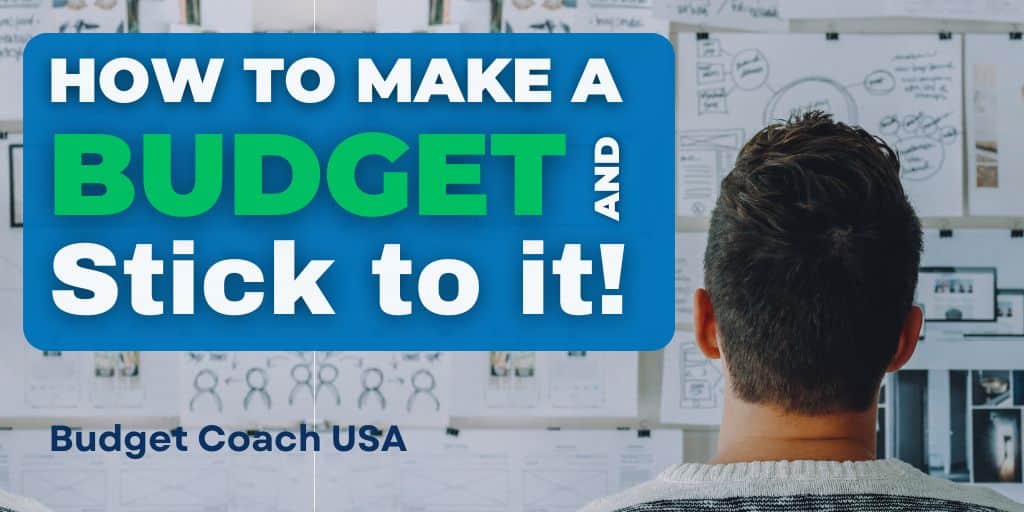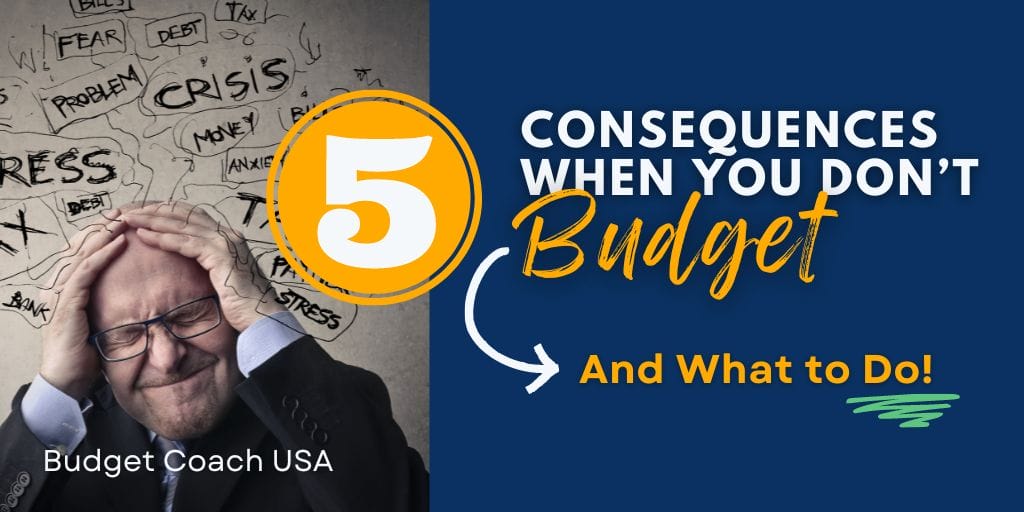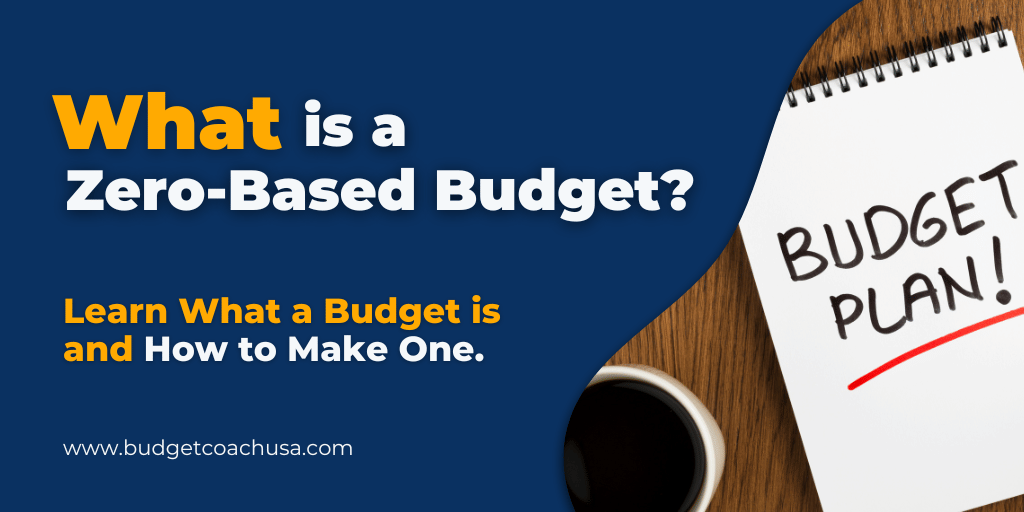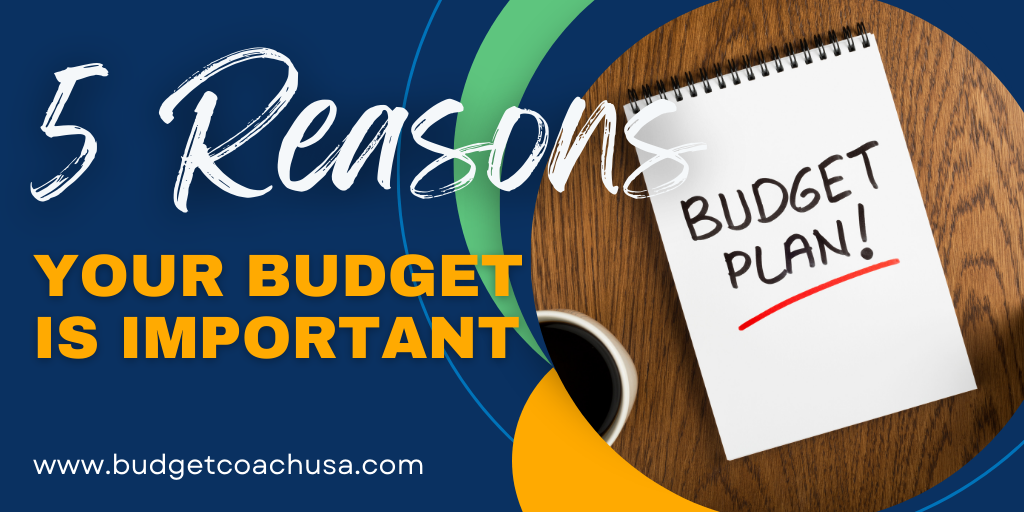Tired of living paycheck to paycheck and paying bills late? Do you always feel like there is not enough money to cover your expenses? There is a way to get a month ahead on bills and begin making progress toward financial wellness. At Budget Coach USA we recommend having a minimum of 3 months worth of household bills (expenses) set aside for what we call an emergency fund.
In this post, we’ll show you how to get at least a month ahead on your bills by establishing an emergency fund. And guess what? It all starts with making and using a zero-based budget.
3 Steps to Get a Month Ahead on Bills
Step 1. Create a monthly zero-based budget.
A monthly zero-based budget is the pillar of financial control. If you want to get a month ahead on your bills you’ll need to begin by creating a zero-based budget so that you can generate the financial margin needed to get ahead. Instead of living paycheck to paycheck and breaking even every month, you’ll need to save money over the course of several months, or more if needed.
- Begin by making a zero-based budget for your monthly income and expenses.
- Once you have acknowledged all of your income and expenses for the next month set aside any extra money in a separate fund. When you are making a zero-based budget you give every dollar of income a job to do such as saving, investing or simply paying a particular bill. So when you make your zero-based budget be sure to include a budget category for “emergency fund“. This is where you’ll save money so you can get a month ahead on bills.
- If you do not have any extra money in your budget then you’ll need to look at each expense category for ways to cut expenses so that you can use those dollars toward your goal of getting a month ahead on bills. Or, look for ways to increase your income so that you’ll have more money to put toward your goal.
- Add to that fund each month until you have the equivalent of one month’s worth of bills set aside.
For an example take a look at the graphic below:

Step 2. Be honest about the numbers and make adjustments.
Getting a month ahead on bills and establishing an emergency fund may begin with a zero-based budget to get control of your money, but if you don’t follow that budget and be honest with yourself about the numbers you won’t succeed. A monthly zero-based budget will, over time, begin to shine a light on your spending habits and where you can better direct your money. However, when this happens some people don’t like to make the adjustments that are needed to win with money. Instead, they ignore overspending and poor choices only to end up with a “budget” that they really don’t follow and is really of no use. A zero-based budget is only helpful to the extent that you are honest with yourself about what your budget is teaching you each month. You may realize that you are spending more than you thought on restaurants for instance but ignoring this discovery will make your budget useless. You can write it down, but without letting the numbers inform your future choices, a budget will be a waste of your time.
- It takes several monthly budgeting cycles to get a zero-based budget optimized to your goals so don’t give up.
- Record your income and expenses faithfully so that you get clear about where your money is going. No cheating.
- Be honest with yourself about what your budget is revealing so that you can win with money.
Step 3. Align your behavior with your goal.
Once you have a zero-based budget in place you will begin to see where your money is going and some things may come as a surprise. Perhaps you have discovered that you spent more on restaurants or subscriptions than you thought or that your truck is guzzling more gas than you thought possible. The numbers may tell you that you need to spend less in these areas to be successful. Making adjustments to your budget, and optimizing it to your goals also means you’ll need to adjust your behavior to the new numbers. Spending is an appetite and our spending patterns are habits. So, changing your spending to save money so that you can get a month ahead on bills will require you to control your appetite and change some habits.
- Create and use a zero-based budget.
- Be honest about the numbers in your budget. Be honest about your true income and your true expenses.
- When your budget begins to show you where you are overspending, underearning, or having difficulties create a budget for the following month that supports your goals. Cut back on expenses or increase your income with a side hustle.
- Spending is an appetite. You’ll need to align your behavior with your goals and control your appetite if you are going to win with money.

Summary: How to Get a Month Ahead on Bills
Living paycheck to paycheck is not fun. It is full of anxiety and for good reason. When you live paycheck to paycheck you are one missed payday away from having significant financial stress. If you want to get a month ahead on bills you’ll need to begin by making a monthly zero-based budget and letting that budget guide your money choices moving forward.
- Create a monthly zero-based budget.
- Be honest about the numbers and adjust your expenses to meet your goals.
- Align your behavior with the numbers to reach your goals.
- Spending is an appetite. Learn how to control your appetite and you can win with money.







